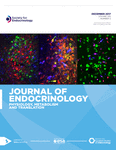Role of adipokines in cardiovascular disease
- Division of Metabolic and Vascular Health, University of Warwick Medical School, Gibbet Hill Road, Coventry CV4 7AL, UK
- (Correspondence should be addressed to H S Randeva; Email: harpal.randeva{at}warwick.ac.uk)
Abstract
The discovery of leptin in 1994 sparked dramatic new interest in the study of white adipose tissue. It is now recognised to be a metabolically active endocrine organ, producing important chemical messengers – adipokines and cytokines (adipocytokines). The search for new adipocytokines or adipokines gained added fervour with the prospect of the reconciliation between cardiovascular diseases (CVDs), obesity and metabolic syndrome. The role these new chemical messengers play in inflammation, satiety, metabolism and cardiac function has paved the way for new research and theories examining the effects they have on (in this case) CVD. Adipokines are involved in a ‘good–bad’, yin–yang homoeostatic balance whereby there are substantial benefits: cardioprotection, promoting endothelial function, angiogenesis and reducing hypertension, atherosclerosis and inflammation. The flip side may show contrasting, detrimental effects in aggravating these cardiac parameters.
- adipokines
- inflammation
- angiogenesis
- CVD
- vascular
- cardiac
- adiponectin
- leptin
- resistin
- visfatin
- apelin
- omentin
- chemerin
- perivascular adipose tissue
- Received in final form 30 October 2012
- Accepted 16 November 2012
- Made available online as an Accepted Preprint 16 November 2012
- © 2013 Society for Endocrinology











